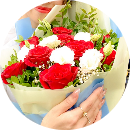Complete the conversation about the artful toy “to he”, using the responses (A-G) given. There are two extra ones.
A. They often came to markets, temples, schools and especially local festivals where children often gathered to play or accompanied their parents.
B.I used to be overjoyed when your grandmother returned from the market with a “to he”.
C. You may eat “to he” after playing with them, but children rarely do that.
D. There are no lessons in “to he” making and sons learn the skill from their father by watching.
E. To create a “to he” figure, an artisan needs a mixture of glutinous and ordinary rice powders that can be pressed in different shapes, and bamboo sticks for the “to he”.
F. The seven basic colours are green, blue, red, purple, yellow, white and black, now made from food dyes that are used to replace colours made from trees or ashes.
G. Modeled by hand, the "to he" are often shaped like animals, flowers and characters in folk stories. Phong: Hello, Mum. You have just come back from the market? What do you hold inyour left hand?
Mother: Here you are. It’s a present for you, Phong.
Phong: It looks very nice... in a shape of a colouful superman. What’s it called, Mum? Mother: It’s called “to he”. (41) ____________________ .
Phong: How can a “to he” be made, Mum?
Mother: (42) _________________
Phong: Made of rice powder? Can we eat it?
Mother: (43) _________________
Phong: I see, Mom. What do the colours come from? Mother: (44) _________________
Phong: Have “to he” artisans come to school to serve students. Mum?
Mother: I think, yes. In the past, they had a compact set of tools so that in just one day they could go to several communal places. (45)_________________
Phong: Hello, Mum. You have just come back from the market? What do you hold inyour left hand?
Mother: Here you are. It’s a present for you, Phong.
Phong: It looks very nice... in a shape of a colouful superman. What’s it called, Mum?
Mother: It’s called “to he”. (41) _______ B.I used to be overjoyed when your grandmother returned from the market with a “to he”._____________ .
Phong: How can a “to he” be made, Mum?
Mother: (42) ______E. To create a “to he” figure, an artisan needs a mixture of glutinous and ordinary rice powders that can be pressed in different shapes, and bamboo sticks for the “to he”.___________
Phong: Made of rice powder? Can we eat it?
Mother: (43) ______C. You may eat “to he” after playing with them, but children rarely do that.___________
Phong: I see, Mom. What do the colours come from? Mother: (44) ______F. The seven basic colours are green, blue, red, purple, yellow, white and black, now made from food dyes that are used to replace colours made from trees or ashes.___________
Phong: Have “to he” artisans come to school to serve students. Mum?
Mother: I think, yes. In the past, they had a compact set of tools so that in just one day they could go to several communal places. (45)_____A. They often came to markets, temples, schools and especially local festivals where children often gathered to play or accompanied their parents.____________











